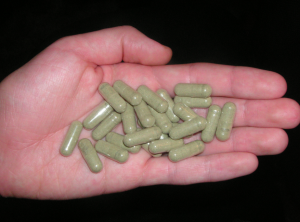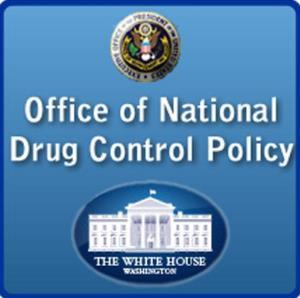No, it's not going to stop drugs from coming into the country.
Or is it getting a bad rap?
A new year and state legislatures are getting back to work. Medical marijuana is on the agenda.
Pennsylvania lawmakers are moving on marijuana legalization, the US finally gets a permanent drug czar, Tijuana saw a bloody year last year, and more.
Wow, that was fast: The first marijuana bill of the new Congress has already been filed, an Arizona sheriff finally hops on board the naloxone train, Ciudad Juarez drug war killings are way up, and more.
The Denver magic mushroom initiative campaign hands in signatures, medical marijuana bills proliferate in Texas, Washington's governor announces plans to pardon small-time pot offenders, and more.
It's a landmark day for voting rights in Florida, New York sees a pair of bills filed to expand medical marijuana access, and more.
The federal government shutdown shutters the drug czar's office, Trump again mischaracterizes the nature of border drug smuggling, New Jersey's highest court lends a hand to drug court graduates seeking expungement, and more.
As the president attempts to make his case for a wall on the US-Mexico border, one of his main selling points is that the wall would reduce the flow of illicit drugs into the country. Of all people, it's not our favorite agency that has rebutted the claim.
That agency is the Drug Enforcement Administration (DEA), which in its 2018 National Drug Threat Assessment released just two months ago makes clear that at best Trump is uninformed and at worst that he is lying to the American people.

The vast majority of drugs smuggled into the US from Mexico come through ports of entry. (Creative Commons)
"Remember drugs. The drugs are pouring into this country. They don't go through the ports of entry. When they do, they sometimes get caught,"
Trump claimed at a Rose Garden news conference last Friday.
It's not a new claim for the president; it has been a pillar of his claim that there is a "crisis" on the border. But repeating a false claim doesn't make it any less false. What is true, as the DEA reports, is that the southwest border "remains the primary entry point for heroin into the United States," but it is not being lugged across the desert via a wall-less border.
According to the DEA, "the majority of the flow is through POVs [privately owned vehicles] entering the United States at legal ports of entry, followed by tractor-trailers, where the heroin is co-mingled with legal goods. Body carriers represent a smaller percentage of heroin movement and they typically smuggle amounts ranging from three to six pounds taped to their torso, or in shoes and backpacks."
To be clear, the body carriers the DEA is talking about are people coming through ports of entry -- not across an open border. The agency reported that only "a small percentage of all heroin seized" along the border was seized between ports of entry.
It's the same thing with fentanyl. According to the DEA, which says fentanyl imports are split between China and Mexico, Mexican drug traffickers "most commonly smuggle multi-kilogram loads of fentanyl concealed in POVs before trafficking the drugs through Southwest Border ports of entry." In the San Diego sector, which saw the biggest fentanyl seizures, 74 percent off seizures were from cars at ports of entry. In the Tucson sector, which had the next highest fentanyl seizure numbers, that figure was 91 percent.
Claiming that building a border wall would reduce the flow of drugs into the country is probably not the biggest lie Trump and his allies have told about the wall, but it is patently false.
back to top
Kratom, an herbal drug derived from a Southeast Asian tree that acts somewhat like an opioid, has become increasingly popular in recent years. Hundreds of thousands of people use it for energy and pain relief in small doses and as a substitute for or to get off of opioids such as heroin or prescription pain pills in larger doses.

kratom capsules (Creative Commons)
It is legal under federal law, although even though the
DEA announced in 2016 it planned to criminalize it by placing it on Schedule I of the Controlled Substances Act -- a move it was forced to walk back following a loud public outcry. It is currently available online, as well as retail outlets across the country -- except in Alabama, Arkansas, Indiana, Tennessee, Vermont, Wisconsin and the District of Columbia, all of which have criminalized it at the state or municipal level.
With the DEA out of the way, the Food and Drug Administration (FDA) took up the regulatory mantle, issuing various recalls for contaminated kratom products and attempting to rein in the booming kratom market. In November 2017, the FDA issued a hair-on-fire press release about the "deadly risks" of kratom use, warning that some 36 deaths nationwide were "associated" with the Southeast Asian herb. In March 2018, the FDA revised the number of deaths "associated" with kratom to 44.
Those numbers were savaged by the American Kratom Association, representing both users and sellers, in a policy report released in response to the FDA claims. That report examined the 33 cases for which information was available and found that the vast majority of them involved the use of multiple drugs, and in none of the cases was kratom shown to actually be responsible for the death.
For example, one case cited by the FDA involved an individual who drank alcohol, smoked heroin and took Xanax and Narco as well as kratom on the evening of his death. In another case cited by the FDA, the cause of death was not even an overdose but the suicide by hanging by a person with alcohol and benzodiazepines in his system, as well as a history of mental health issues.
In yet another case the FDA called kratom-related, the victim was a 300-pound man who died of pulmonary thromboemboli caused by deep vein thrombosis, who, in addition to having kratom in his system, had also consumed opioids, benzodiazepines, cannabinoids, oxycodone, fluoxetine, norfluxoetine, trazodone, alprazolam, nordiazepan, and gabapentin.
"None of the case reports released to date support the evidentiary standard required by the CSA to prove there is a risk to the public health that relies primarily on the FDA claim of ‘numerous deaths associated with kratom,'" concluded report author Jane Babin.
Now, new research reported in a January 2 letter in the New England Journal of Medicine casts further doubt on the FDA's contentions about dangerousness. In that study, researchers at the University of Colorado examined 15 kratom-related deaths in the state and found that in all but one other opioids were present.
"When cases are considered kratom-only deaths, there really should be additional testing done, because in all of the cases we examined, we found other drugs involved when we did more comprehensive testing," said lead researcher Dr. Andrew Monte, an associate professor of emergency medicine.
Although the evidence that kratom is a killer is weak, Monte told it likely increases the risk of overdose when mixed with other drugs, but not when used alone. That led him to support a ban on the drug, although he acknowledged it could help people trying to get off opioids.
"It's probably worth examining what therapeutic role this may have," he said. "This may be a very good, reasonable option for opioid withdrawal for some patients."
In the meantime, hundreds of thousands of Americans are deciding for themselves that it works for them.
This article was produced by Drug Reporter, a project of the Independent Media Institute.
back to top
A new year and state legislatures are getting back to work. Medical marijuana is on the agenda.
New Hampshire Lawmaker Files Pair of Medical Marijuana Bills. Rep. Renny Cushing (D) has filed two bills related to medical marijuana. HB 366 would add opioid addiction as a qualifying condition, while HB 364 would allow patients and caregivers to grow their own medicine.
New York Bills Would Allow Medical Marijuana Smoking, Use at Schools. Sen. Gustavo Rivera (D) has pre-filed SB 490, which would allow patients to smoke their medicine, but bar smoking anyplace where tobacco smoking is banned, while Sen. Brian Benjamin (D) has pre-filed SB 219, which would allow designated caregivers to administer medical marijuana to patients on school grounds or school-sponsored events.
South Carolina Medical Marijuana Bill Prefiled. State Rep. Rosalyn Henderson-Myers (D-Spartanburg) has pre-filed a medical marijuana bill, HB 3081. The bill would allow patients to possess and consume -- but not grow -- marijuana. It would also allow licensed shops to cultivate and sell medical marijuana and require them to use laboratories for testing.
Texas Sees a Dozen Medical Marijuana Bills Filed. The session hasn't even opened yet, and there are 12 medical marijuana bills already pre-filed. Two to watch are SB 90, a standard medical marijuana bill, and SB 209, which would allow for the home cultivation of medical marijuana.
[For extensive information about the medical marijuana debate, presented in a neutral format, visit MedicalMarijuana.ProCon.org.]
back to top
Pennsylvania lawmakers are moving on marijuana legalization, the Trump administration finally gets a permanent drug czar, Tijuana saw a bloody year last year, and more.

Colombian coca farmers have been busy expanding their crop, and the US is concerned. (DEA)
Pennsylvania Lawmakers Get Moving on Legalization. On Wednesday, legalization proponent Sen. Daylin Leach (D) revealed that he and Sen. Sharif Street (D) are in the final stages of preparing a bill to legalize marijuana. On Thursday, Rep. Jake Wheatley Jr. (D) sent out a cosponsorship memo seeking support for a soon-to-filed House bill he described as "the most comprehensive legalization legislation to date."
Drug Policy
Senate Approves James Carroll as Drug Czar. James Carroll, who has been acting head of the Office of National Drug Control Policy (ONDCP -- the drug czar's office) since February, was confirmed as director Wednesday in one of the last acts of the lame duck Senate. Now, after nearly two years without a drug czar, the White House finally has a top drug policy advisor other than Kellyanne Conway.
Foreign Policy
Pompeo "Concerned" Over Colombia Coca Cultivation Increase. In a meeting with Colombian President Ivan Duque Wednesday, Secretary of State Mike Pompeo said the US is deeply concerned about rising levels of coca cultivation there. He also said the US would work with Colombia to cut production in half within five years.
International
Tijuana Saw 2,500 Murders Last Year as Drug Wars Raged. The state attorney general's office released a year-end report on December 31 saying that Tijuana had seen 2,499 registered homicides in 2018, but more bodies were found before day's end, bringing the toll past 2,500. The report said about 85% of the killings were related to the drug trade, especially a turf war between the New Generation Tijuana Cartel (aligned with the New Generation Jalisco Cartel) and the Sinaloa Cartel. But some of the killings are a result of factional fights within the Sinaloa Cartel over lucrative street-level markets and smuggling routes to the US.
back to top
Wow, that was fast: The first marijuana bill of the new Congress has already been filed, an Arizona sheriff finally hops on board the naloxone train, Ciudad Juarez drug war killings are way up, and more.

Deputies in Pima County, Arizona, will finally start carrying the overdose reversal drug naloxone. (pa.gov)
The New Congress Just Saw Its First Marijuana Bill Filed. That didn't take long. Reps. Steve Cohen (D-TN) and Don Young (R-AK) on Thursday reintroduced the Compassionate Access, Research Expansion and Respect States (CARERS) Act. The bipartisan bill would protect state medical marijuana programs from federal interference and open the way for doctors at the Veterans Administration to recommend medical marijuana. The bill is not yet available on the congressional website, but you can view last year's version here. Sen. Cory Booker (D-NJ) is expected to file the Senate version soon.
Heroin and Prescription Opioids
Georgia Joins List of States Suing Opioid Makers for Fueling Drug Crisis. Georgia has now become the latest of more than 30 states that have filed lawsuits against pharmaceutical companies for what they say is their role in fueling the opioid crisis. The state is suing nine opioid makers and distributors in state court for what it calls racketeering and for creating the crisis. "We have over a 1,000 Georgians that died last year, more Georgians dying every day. We have over 1,000 Georgians right now that are suffering from an opioid misuse disorder," said Attorney General Chris Carr. The state is seeking both monetary damages to repay it for costs incurred fighting the epidemic, as well as punitive damages.
Harm Reduction
Arizona's Pima County Sheriff Finally Gets on Board With Deputies Carrying Naloxone. Pima County, home to the state's second largest city, Tucson, has gotten with the program and the sheriff's department will now issue the overdose reversal to deputies. Deputies in eleven of the state's 15 counties already carry it. Department officials had previously argued it was necessary for deputies because paramedics already carried it and because it might become unstable in the Arizona summer heat, but Sheriff Mark Napier admitted Wednesday that medical experts had told him the worse that could happen was that it might not work.
International
Mexico's Ciudad Juarez Had Nearly 1,250 Murders Last Year. The border city just across the Rio Grande from El Paso saw a big spike in murders last year, most of them drug prohibition-related. The state attorney general's office reported 1,247 killings last year, a big increase from the 772 people killed in 2017 and nearly triple the number killed in 2014. Most of the violence is related to the revival of the Juarez Cartel and to the defection of a key Los Aztecas leader to La Linea. Los Aztecas are also in the midst of internal factional strife. But wait, there's more: There's also a factional fight within Los Artistas Asesinos (Assassin Artists), a street enforcement gang with links to the Sinaloa Cartel, which is also working in the area.
back to top
The Denver magic mushroom initiative campaign hands in signatures, medical marijuana bills proliferate in Texas, Washington's governor announces plans to pardon small-time pot offenders, and more.

Decriminalize Denver handed in thousands of signatures for its municipal psilocybin initiative Monday. (Creative Commons)
Connecticut House Speaker Vows to Work on Legalization. House Speaker Joe Aresimowicz (D) has said he would support marijuana legalization and work with his caucus to advance it. "I think we should legalize it," he said. "I will work with my caucus to get there, but it needs to be done in a responsible fashion that mirrors our medical marijuana program." The Senate president and the governor-elect have also said they are ready to end pot prohibition this year.
Massachusetts Commission Report Lists 19 Steps to Toughen Driver Drug Testing. A special commission has issued a report recommending 19 steps lawmakers should take to open the way for tougher drug testing of drivers in the wake of marijuana legalization there. One recommendation was to train more than 300 drug recognition experts; another was to expand the state's implied consent law for driving while intoxicated to include impairment due to drugs.
Washington Governor Will Pardon Small-Time Pot Possessors. Gov. Jay Inslee (D) said last Friday he plans to pardon thousands of people convicted of personal pot possession charges. He said he would create an expedited process so some 3,500 people could apply for and receive pardons without having to go to court or hire a lawyer.
Medical Marijuana
Texas Sees a Dozen Medical Marijuana Bills Filed. The session hasn't even opened yet, and there are 12 medical marijuana bills already prefiled. Two to watch are SB 90, a standard medical marijuana bill, and HB 209, which would allow the home cultivation of medical marijuana.
Kratom
Utah Bill Would Keep Kratom Legal. State Sen. Curt Bramble (R-Provo) has said he will sponsor a bill to keep kratom legal after hearing from the herb's supporters. "I view this kind of in the same vein as medical marijuana," he said. "I've had people tell me kratom is an alternative for addictive opiates and that's what convinced me." He said his bill will keep kratom legal in its "pure" form, but not if "adulterated" with other additives.
Psychedelics
Denver Magic Mushroom Initiative Hands in Signatures. Organizers with Decriminalize Denver handed in more than 8,000 raw signatures Monday for their municipal magic mushroom initiative. The measure would make psilocybin and the mushrooms that contain it the lowest law enforcement priority and would bar the use of city funds to impose penalties on users or possessors. The measure needs 4,726 verified signatures to make it to the ballot.
back to top
It's a landmark day for voting rights in Florida, New York sees a pair of bills filed to expand medical marijuana access, and more.

medical marijuana (Creative Commons)
South Carolina Medical Marijuana Bill Prefiled. State Rep. Rosalyn Henderson-Myers (D-Spartanburg) has prefiled a medical marijuana bill, HB 3081. The bill would allow patients to possess and consume -- but not grow -- marijuana. It would also allow licensed shops to cultivate and sell medical marijuana and require them to use laboratories for testing.
New York Bills Would Allow Medical Marijuana Smoking, Use at Schools. Sen. Gustavo Rivera (D) has pre-filed SB 490, which would allow patients to smoke their medicine, but bar smoking anyplace where tobacco smoking is banned, while Sen. Brian Benjamin (D) has pre-filed SB 219, which would allow designated caregivers to administer medical marijuana to patients on school grounds or school-sponsored events.
Voting Rights
Florida Formerly Incarcerated Can Now Sign Up to Vote. As of today, Floridians with felony convictions who have served their sentences can now register to vote. This is the result of state voters' November approval of Amendment 4, which passed with 64% of the vote. "This is a historic moment," said Melba Pearson, deputy director of the American Civil Liberties Union of Florida.
back to top
The federal government shutdown shutters the drug czar's office, Trump again mischaracterizes the nature of border drug smuggling, New Jersey's highest court lends a hand to drug court graduates seeking expungement, and more.

closed down in the shutdown
New Hampshire Lawmaker Files Expungement Bill. Rep Renny Cushing (D) has filed a bill, HB 399, that would let people with convictions for possessing less than three-fourths of an ounce of weed before September 2017 have their records cleared. That date is when the state law decriminalizing pot possession went into effect.
DC Lawmaker Files Full Legalization Bill. Councilmember David Grosso (I) has reintroduced the Marijuana Legalization and Regulation Act, which would allow the city to establish a system of retail marijuana sales. Such a move has been blocked by House Republicans, and its prospects this year remain uncertain, but Grosso is moving ahead anyway.
Medical Marijuana
New Hampshire Lawmaker Files Pair of Medical Marijuana Bills. Rep. Renny Cushing (D) has filed two bills related to medical marijuana. HB 366 would add opioid addiction as a qualifying condition, while HB 364 would allow patients and caregivers to grow their own medicine.
Asset Forfeiture
North Dakota Lawmaker Files Bill to End Civil Asset Forfeiture. Rep. Rick Becker (R-Bismarck) has filed House Bill 1286, which would end civil asset forfeiture in the state. He filed a similar bill in 2017 that passed the House, but got zero votes in the Senate after it was opposed by Attorney General Wayne Stenehjem, who remains in office but has refused so far to comment on this year's bill.
Drug Policy
Trump Once Again Misstates How Drugs Cross the Border With Mexico. In his oval office speech Tuesday night making his case for a border wall, President Trump once again mischaracterized the nature of drug smuggling across the Mexican border. While he was correct in stating that the vast majority of drugs coming into the country come through Mexico, his own DEA reported in November that "only a small percentage" of heroin and other drugs comes through areas outside of ports of entry.
Federal Government Shutdown Shutters Drug Czar's Office. Among the casualties of the shutdown is the Office of National Drug Control Policy (ONDCP -- the drug czar's office). If the shutdown continues up to the end of the month, funding for important grant programs involving law enforcement and prevention could be jeopardized.
Expungement
New Jersey Supreme Court Eases Requirements for Drug Court Graduates. The state Supreme Court ruled 7-0 Tuesday that drug offenders who have successfully completed a court-ordered treatment program do not have to prove that expunging their criminal records of those offenses is in the public interest. Instead, the high court ruled, the burden to demonstrate that the public interest requirement was not met should fall on the state. "In light of the rigorous monitoring that is the hallmark of drug court, as well as the new law's overall policy in favor of expungement for successful graduates, we find that participants are entitled to a rebuttable presumption that expungement is consistent with the public interest," the court held.
back to top







